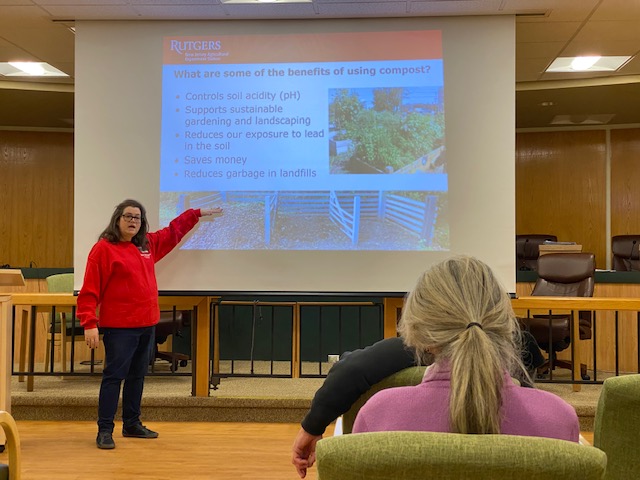From left, Rutgers Cooperative Extension and Master Gardener Coordinator Belinda Chester, Warren Grossman and Debbie Frank check out the compost bin at the rear of Longport Borough Hall
By NANETTE LoBIONDO GALLOWAY
LONGPORT Residents learned the basics of composting during a special Sustainable Longport seminar held Tuesday, April 19 at Borough Hall.
Rutgers Cooperative Extension Program Associate and Master Gardener Coordinator Belinda Chester encouraged residents to start a compost pile from vegetable scraps, leaves and grass clippings that decompose and create a crumbly, earthy smelling mixture that will improve aeration, and add nutrients and organisms to the soil.
That happens naturally in the forest, but we can replicate it at home, she said.
Debbie Frank, a member of the borough's green team, said the idea of holding a composting workshop came to light after Sustainable Longport Chairman Tom Subranni donated a used tumbler styled compost bin to the community garden at the rear of Longport Borough Hall.
Belinda was great, and she shared a lot of great information, Frank said.
Warren Grossman of Ventnor attended the seminar to learn more about the proper way to compost after his prior attempt didn't work out so well, he said.
I also had a compost tumbler given to me by a friend, so I came here to learn how to do it the right way. During the winter, I guess I didn't turn it enough, he said.
 Belinda Chester educates Longport residents how to properly compost during a seminar at Borough Hall.
Belinda Chester educates Longport residents how to properly compost during a seminar at Borough Hall.
Chester explained there are several ways to successfully compost, including the lazy way of just piling everything into a 3- by 3-foot area and letting it compost naturally.
But that method takes longer, she said. If you do that, it might take 18 months to two years to generate compost for your garden.
Chester said compost provides for health root development, helps with moisture retention and drainage, controls pH and reduces the amount of garbage put into landfills.
One man questioned putting grass clippings from chemically treated lawns into the pile.
If you want to say you garden organically, then no, Chester said. However, the chemicals used in lawn treatments today are created to dissipate within a year or two.
Chester recommended a 30:1 ratio of carbon rich brown materials, such as leaves, hay, wood chips, newsprint and shredded cardboard, to nitrogen rich green materials, such as vegetable scraps without seeds, grass clippings and weeds without their seed heads. Never use meat scraps or greasy foods, diseased plants, weeds with seeds, or dog or cat feces, she said.
If the mixture is kept moist, heated to between 131 and 170 degrees, and turned often, it will take three to six months to develop into an organic compost that will enrich the soil.
A compost pile measuring 3 feet by 3 feet will produce enough compost to cover 100 square feet of garden with a half-inch of compost that can be tilled to 6 inches below the surface of the garden. The best time to start a compost pile is in autumn when the leaves start falling. If started then and properly heated and maintained, the compost will be ready to spread in spring.
Chester said compost enclosures can easily be created from wooden pallets, slatted fencing or chicken wire, while enclosed bins can easily be purchased at the Atlantic County Utilities Authority Recycling Center in Egg Harbor Township.
She briefly talked about vermicomposting, which is using red worms to break down the compost.
After the talk, residents toured the raised community garden beds at the rear of the building, which will be planted with vegetables and herbs for the growing season.
Copyright Mediawize, LLC 2021